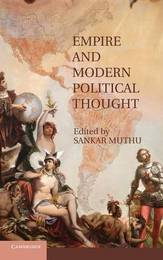
|
Empire and Modern Political Thought
Hardback
Main Details
| Title |
Empire and Modern Political Thought
|
| Authors and Contributors |
Edited by Sankar Muthu
|
| Physical Properties |
| Format:Hardback | | Pages:418 | | Dimensions(mm): Height 229,Width 152 |
|
| Category/Genre | Social and political philosophy |
|---|
| ISBN/Barcode |
9780521839426
|
| Classifications | Dewey:320.01 |
|---|
| Audience | | Tertiary Education (US: College) | | Postgraduate, Research & Scholarly | | Professional & Vocational | |
|---|
|
Publishing Details |
| Publisher |
Cambridge University Press
|
| Imprint |
Cambridge University Press
|
| Publication Date |
17 September 2012 |
| Publication Country |
United Kingdom
|
Description
This collection of original essays by leading historians of political thought examines modern European thinkers' writings about conquest, colonization and empire. The creation of vast transcontinental empires and imperial trading networks played a key role in the development of modern European political thought. The rise of modern empires raised fundamental questions about virtually the entire contested set of concepts that lay at the heart of modern political philosophy, such as property, sovereignty, international justice, war, trade, rights, transnational duties, civilization and progress. From Renaissance republican writings about conquest and liberty to sixteenth-century writings about the Spanish conquest of the Americas through Enlightenment perspectives about conquest and global commerce and nineteenth-century writings about imperial activities both within and outside of Europe, these essays survey the central moral and political questions occasioned by the development of overseas empires and European encounters with the non-European world among theologians, historians, philosophers, diplomats and merchants.
Author Biography
Sankar Muthu is Associate Professor of Political Science at the University of Chicago. He is the author of Enlightenment against Empire.
Reviews'... this book consists of twelve carefully written and tightly argued essays that add up to more than the sum of their parts ... the study of modern imperialism will oblige political scientists (and historians) to move outside our comfort zones, and to embrace approaches that are expedient, eclectic and trans-disciplinary. This fine volume should work as a catalyst, stimulating and facilitating further work as the enterprise it surveys moves ahead.' Theodore Koditschek, Canadian Journal of History
|